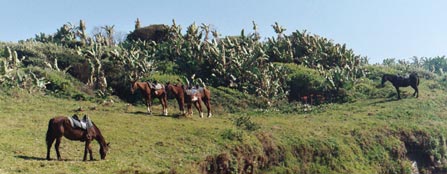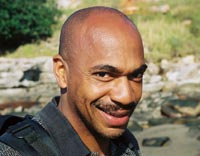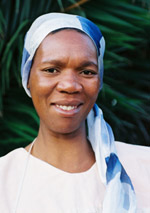A Changing South Africa – Part Three
Air Date: Week of July 16, 2004
On horseback and on foot, Living on Earth travels through spectacular Wild Coast beaches, red sand dunes and the grassy hills that are home to the Xhosa people. Our host is Amadiba Adventures, South Africa’s only community-owned and operated eco-tourism business.
Transcript
[FOOTFALLS, CRICKET SONG]
MXHUMA: It has so many things. Like desert-like areas, and forest, and all landscape, gorgeous. It’s because of its beauty.
CURWOOD: Lindele Mxhuma loves his workplace: the Pondoland Wild Coast of South Africa. He works as a guide, leading tourists on foot and horseback to various attractions and campsite in the area
[HORSES TROTTING IN SAND]
CURWOOD: Riding horses along the beach, a group of Living on Earth listeners has joined producer Eileen Bolinsky and myself for a few days to sample an eco-tour led by Lindele. The Amadiba Coastal Community Trust has created these eco-tours as part of their efforts to bring jobs and income to the community without undermining the traditional culture or altering the landscape.
JEFFERIS: The beaches are just a fascinating asset, just some of the most beautiful beaches I have ever seen.
CURWOOD: Frank Jefferis is a Living on Earth listener from Illinois.
JEFFERIS: Long, wide open beaches, no one there, with a big beautiful dark green dune from the foliage behind you. And beautiful rolling waves. It's just a beautiful asset they have here.
[HORSES TROTTING ]
CURWOOD: We ride on beach after beach, making our way right at the edge of the surf. Soon our hot and tired mounts head over some grasslands and down to the Kwanyana campsite, which is next to a stream. At the camp I check in with Michael Giles, head of the travel agency Heritage Africa that arranged the Living on Earth safari. Michael has also donated safaris for some lucky listeners in exchange for underwriting credits. I ask him just why he recommended this trip on the Amadiba Trails.
GILES: Well, the situation in Africa and in other parts of the world, but particularly Africa, is that you have very poor people that live in very beautiful areas with a lot of wildlife, and those things are of value to people in the west. But it's not of as great value to them because they are contending with how to feed their families and how to take care of themselves. So one way that the West can actually vote in a very positive way, and a very effective way, to preserve these fragile areas, is actually to come see them. [BREAKFAST SOUNDS] CURWOOD: Morning seems to come awfully quickly for tired folks with newly bowed legs. But the smells from the kitchen are tempting. [BREAKFAST SOUNDS] HLONGWA: Everybody, please, breakfast is ready. I've got soft porridge in here. I've got some cereals in there. I've got the homemade bread and some eggs in here. The ladies will be busy dish upping eggs on the table, so please help yourself. [BREAKFAST SOUNDS] CURWOOD: Sbongile Hlongwa is the Kwanyana camp director, and I ask her what difference the Amadiba eco-tourism project has made for the lives of the people here.
HLONGWA: Ohhh, it makes a very big difference because many families are benefiting in this business. Even though, let's say maybe you are not working personally, if you are having a horse you are working here. Because if your horse is taking a tourist along the trail we are going to get something, you are going to get paid. So, it's making a lot of difference here in Amadiba. CURWOOD: So if you own a horse it helps. Anybody else? HLONGWA: With other families -- like me, I'm working here, I benefit, you see. I don't have a horse, but I am working, so I benefit here. [HORSES BEING PREPPED] CURWOOD: Soon it’s time to round up horses and get moving. [HEP HEP! CLICKS] CURWOOD: So, the name of this horse is? MXHUMA: Record. CURWOOD: Like “record”? MXHUMA: Record, yeah. CURWOOD: Like the radio business, huh? MXHUMA: Yes, I think he will be fine for you today. CURWOOD: I sure hope so. (Laughing) [HORSES TROTTING] CURWOOD: The grasslands give way to red sand dunes. We follow another series of beaches as one day seems to flow into the next. At one point, we get off our horses to hike up away from the ocean. We scramble up a hill through some exotic vegetation and come out onto a huge covered ledge -- almost a cave, really -- that is home to a troop of baboons. And since the baboons are out, our group settles on the ledge overlooking a giant pool. But it doesn’t take a lot of urging to get a couple of the more adventurous folks to jump into the water below. [WHOOPING, WATER SPLASHING] CURWOOD: Along with the high adventure there are ecological lessons, too. Passing by the Mtentu estuary late one day we noticed palm trees on the north side of the river looking a bit out of place from, say, the South Pacific. They’re Pondo Palms, found nowhere else in the world. [DISHING CLANKING] CURWOOD: Back at camp, it’s time to rest our bones and have some supper. Tonight’s menu is chakalaka, a traditional South African specialty blend of beans, onions, carrots and hot peppers. And under the clear starry sky it’s time for that most ancient of human customs: stories and songs around the fire. A guide named Rhoo Nzonzo begins. NZONZO: There was a boy called Japie, and he was staying with his father and his mother. And then he was having the dog … CURWOOD: It seems that more than one culture has the tradition of the shaggy dog story, and this one is about a boy whose parents go away, leaving him in charge. His dog has to defend the household from a dangerous lynx. NZONZO: They fought and fought, and it is said it was indistinguishable whether which one is the dog and which one was the lynx because all of them were red in color… CURWOOD: The story ends with Yapie’s parents returning home, proud that their son had protected their property. They declare that he has become a man. And then Rhoo calls for a song. [A CAPELLA SINGING, THEN APPLAUSE] CURWOOD: After four days on the trail, the Living on Earth listeners are leaving. Jenny Carter from Vermont says she is now concerned about the fate of what she calls “one of the most beautiful places on earth.” CARTER: I hope they’re able to meet their goals of getting enough people here. Well, they have a contradiction that they have to live with, which is wanting to preserve their culture, but at the same time having to bring people in from the outside to have a strong enough economy to preserve their culture. So they’ve got a real contradiction. But I guess the greater harm for their culture would be having massive development. CURWOOD: I ask Lindele, our guide, to look into the future, perhaps 20 years, and say what he’d like to envision for his people here. MXHUMA: I would like to see my people getting educated. You know, there are quite few schools that we have here. The illiteracy rate is very high in this area. So many people are not educated. And people having clinics -- there’s no clinic in this area. When someone is sick has to go to Port Edward to Bizana, which is very far from here. CURWOOD: What would be your hopes for the land? The environment here at Pondoland? MXHUMA: I would like to see this place staying as what it is now in the next 20 years, if that would happen. But I would like to see it what it is. This is the only place that we have in South Africa. There is no such place. Only this Wild Coast that is still like this. All the coasts are damaged in South Africa, so I would like to see the Wild Coast staying like this. CURWOOD: South Africa has already provided leadership to the world with its relatively bloodless end to apartheid, and a strong spirit of racial reconciliation that is evident here and almost anywhere one goes in the country. As the third most biologically diverse nation in the world, behind only Brazil and Indonesia, much is riding on the success or failure of the attempts here to use eco-tourism to bring about sustainable development. Links
|


 Michael Giles of Heritage Africa (Photo: Steve Curwood)
Michael Giles of Heritage Africa (Photo: Steve Curwood)  Sbongile Hlongwa manages the Kwanyana campsite (Photo: Steve Curwood)
Sbongile Hlongwa manages the Kwanyana campsite (Photo: Steve Curwood) 



